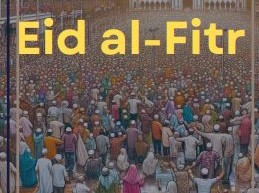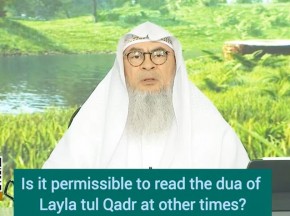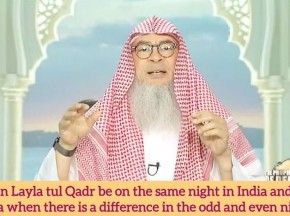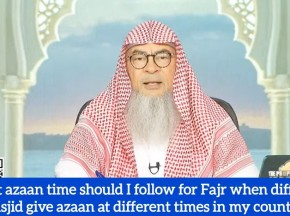content of level
Eid al-Fitr
The Eid prayer The Eid prayer is a collective duty, which means that when some Muslims offer it, the rest are not accountablefor their omission
What do we receive as compensation when someone SLANDERS us? #assimalhakeem
What do we receive as compensation when someone SLANDERS us? #assimalhakeem assim al hakeem
Is it sunnah to wear White Clothes? Does it include Cream & Off White as well #assim
Is it sunnah to wear White Clothes? Does it include Cream & Off White as well #assim assim al hakeem
Does dirt, soil in heel lines & footprints act as a barrier in wudu? #assimalhakeem
Does dirt, soil in heel lines & footprints act as a barrier in wudu? #assimalhakeem - assim al hakeem
Can we recite Laylatul Qadr dua at other times? #assimalhakeem
Can we recite Laylatul Qadr dua at other times? #assimalhakeem #assim assim al hakeem
Is husband's verbal gift to wife without anyone knowing remain valid after his death
Is husband's verbal gift to wife without anyone knowing remain valid after his death - assim al hakeem
If imam makes a mistake in salah, must I follow the imam in sujood as sahu? #assima
If imam makes a mistake in salah, must I follow the imam in sujood as sahu? #assima assim al hakeem
Seeking forgiveness from someone I have wronged (cause more harm than good?) #assim
Seeking forgiveness from someone I have wronged (cause more harm than good?) #assim assim al hakeem
Bought stolen SIM card & use it to make income, is the earning haram? #assimalhakeem
Bought stolen SIM card & use it to make income, is the earning haram? #assimalhakeem assim al hakeem
What is Isbaal (garment below ankles) Is it Haram or Makrooh (with / without pride)
What is Isbaal (garment below ankles) Is it Haram or Makrooh (with / without pride) - assim al hakeem
How can Laylatul Qadr be on same night in India & Saudi (Odd & Even nights) #assim
How can Laylatul Qadr be on same night in India & Saudi (Odd & Even nights) #assim assim al hakeem
Afraid my duas aren't being accepted due to past sins, what to do? #assimalhakeem
Afraid my duas aren't being accepted due to past sins, what to do? #assimalhakeem assim al hakeem
In last ten nights of Ramadan Imam doesn't pray witr after taraweeh, will I get full reward?
In last ten nights of Ramadan Imam doesn't pray witr after taraweeh, will I get full reward? assim al hakeem
Two imams lead taraweeh & witr, is it sufficient to pray only taraweeh with 1st imam
Two imams lead taraweeh & witr, is it sufficient to pray only taraweeh with 1st imam - assim al hakeem
Does water reaching the throat break my fast? #assimalhakeem
Does water reaching the throat break my fast? #assimalhakeem #assim assim al hakeem
Masjid does dua of khatam al Quran in taraweeh, I stay until Witr to get full reward, am I sinful?
Masjid does dua of khatam al Quran in taraweeh, I stay until Witr to get full reward, am I sinful? assim al hakeem
Is it halal to serve food to non muslims during the day in Ramadan? #assimalhakeem
Is it halal to serve food to non muslims during the day in Ramadan? #assimalhakeem assim al hakeem
What adhan 2 follow for fajr (suhoor, sehri) when masjids give athan at different times (Umm al qura
What adhan 2 follow for fajr (suhoor, sehri) when masjids give athan at different times (Umm al qura) assim al hakeem
Siren (or cannon) instead of maghrib adhan to indicate time for iftar - permissible?
Siren (or cannon) instead of maghrib adhan to indicate time for iftar - permissible? assim al hakeem
Is bulking & bodybuilding permissible in Islam? #assimalhakeem
Is bulking & bodybuilding permissible in Islam? #assimalhakeem #assim assim al hakeem




















